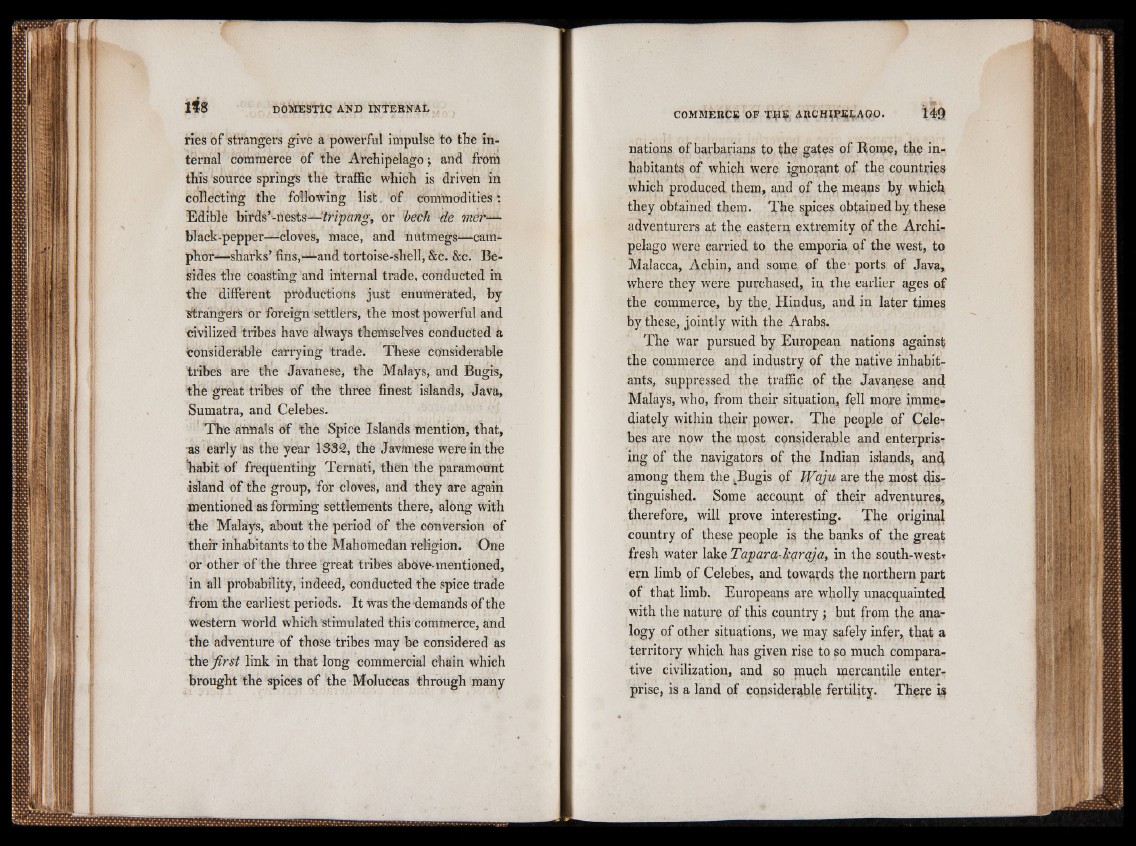
Ties of strangers give a powerful impulse to the internal
commerce Of the ATchipelago ; and from
this source springs the traffic which is driven in
collecting the following list of commodities :
Edible birds’-nests—'tripàng, or bech de mer—
black-pepper—cloves, mace, and 11 ntmegs—camphor—
sharks’ fins,—and tortoise-shell, &c. &c. Besides
the coasting and internal trade, conducted in
the different productions just enumerated, by
Strangers or foreign settlers, the most powerful and
civilized tribes have always themselves conducted a
considerable carrying trade. These considerable
tribes are the Javanese, the Malays, and Bugis,
the great tribes of the three finest islands, Java,
Sumatra, and Celebes.
The annals of the Spice Islands mention, that,
as early as the year 1832, the Javanese were in the
"habit of frequenting Ternati, then the paramount
island of the group, for cloves, and they are again
mentioned as forming settlements there, along with
the Malays, about the period of the conversion of
their inhabitants to the Mahomedan religion. One
or other of the three great tribes above-mentioned,
in all probability, indeed, conducted the spice trade
from the earliest periods. It was the demands of the
Western world which stimulated this commerce, and
the adventure of those tribes may be considered as
thz first link in that long commercial chain which
brought the spices of the Moluccas through many
nations of barbarians to the gates of Bomc, the inhabitants
of which were ignorant of the, countries
which produced them, and of the means by which
they obtained them. T he spices obtained by these
adventurers at the eastern extremity pf the Archipelago
were carried to the emporia of the west, to
Malacca, Achin, and some of the* ports of Java,
where they were purchased, in the earlier ages of
the commerce, by the, Hindus, and in later times
by these, jointly with the Arabs.
The war pursued by European nations against
the commerce and industry of the native inhabitants,
suppressed the traffic of the Javanese and
Malays, who, from their situation, fell more immediately
within their power. The people of Celebes
are now the most considerable and enterprising
of the navigators of the Indian islands^ and
among them the tBugis of fflaju are the most distinguished.
Some account of their adventures,
therefore, will prove interesting. The priginal
country of these people is the banks of the great
fresh water lake Taparafiarqja, in the south-western
limh of Celebes, and towards the northern part
of that limb. Europeans are wholly unacquainted
with the nature of this country y but from the analogy
of other situations, we may safely infer,, that a
territory which has given rise to so much comparative
civilization, and so much mercantile enterprise,
is a land of considerable fertility. There is